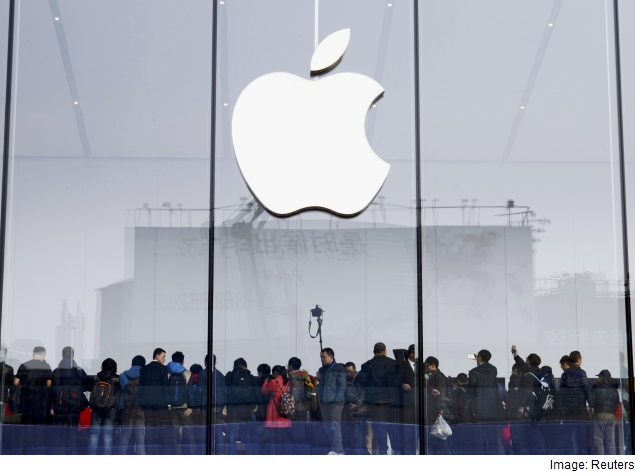- Home
- Tv
- Tv Features
- Apple Can Skate by Taylor Swift, but Not Product Missteps
Apple Can Skate by Taylor Swift, but Not Product Missteps

In the past few years, Apple has become the most valuable company in the world as well as one of the most scrutinized. Officials in Europe and the United States are looking into Apple's deals with music labels for possible antitrust violations.
But as Apple prepares to start its long-anticipated subscription streaming music service Tuesday, few marketing experts expect the scuffle with Swift to leave any scars. Instead, they think it turned out to be remarkably good publicity.
"I don't think the episode has damaged their brand at all," said Jordan Cohen, the chief marketing officer of Fluent, a consumer marketing firm. "More than anything, it served to shine a huge spotlight on its newest offering with a week to go until launch."
The new Apple Music service has the potential over the next two years to draw 100 million subscribers, according to Jan Dawson, an independent technology analyst for Jackdaw Research. That would more than double the combined 41 million paid subscriptions to all of the current music streaming services last year, the International Federation of the Phonographic Industry, a trade group in London, estimates.
Skating past controversy has become an important skill for Apple in recent years, and the company's quick response to Swift's public letter offers a window into how the Silicon Valley giant responds to criticism.
As long as iPhones and Macs are flying off the shelves, analysts and marketing experts say, Apple has little reason to listen to its critics - except when they are the rare few like Swift that can have a direct impact on its sales.
"What she says is gold, and at this point she has managed to attain so much brand power that it's hard for even companies like Apple to not pay attention," said Erik Ashdown, a founder of Indiloop, a music creation service.
In her open letter, titled "To Apple, Love Taylor," Swift said she was withholding her latest album from Apple Music because artists like her were unhappy with the company's decision to skip paying royalties to musicians during the three-month free trial of the new music service.
Within a day, Apple's head of online services, Eddy Cue, tweeted that musicians would be paid during the three-month trial.
"We hear you @taylorswift13 and indie artists. Love, Apple," he tweeted.
Government regulators might be chagrined to realize that a 25-year-old musician had better luck curbing Apple's behavior than they have had.
Apple, which is based in Cupertino, California, continues to fight a federal judge's 2013 decision that it conspired with book publishers to raise ebook prices. Apple continues to appeal the decision, and it has also been resistant to cooperating with a lawyer that the court appointed to monitor its operations to ensure compliance with antitrust laws.
More recently, in Europe and the United States, antitrust regulators opened investigations into Apple Music. They are trying to find out whether Apple pressured music labels - or whether labels conspired with Apple and one another - to withdraw support for popular "freemium" services offered by companies like Spotify in favor of Apple's paid music subscriptions.
So far, the antitrust investigations into Apple Music have not produced evidence of collusion. This month, the Universal Music Group said in a letter to the state attorneys general of New York and Connecticut that it had no agreements with Apple that would impede the availability of free or ad-supported services.
But if consumers are weighing in with their wallets, they have shown complete indifference to the regulatory issues. In the fiscal second quarter, sales of iPhones were up 40 percent year over year, and sales of Mac computers were up 10 percent year over year. The company has accumulated more than $193.5 billion in cash.
"When you think Apple, you think very easy to use and great experience," said Greg Portell, a partner of A. T. Kearney, a global management consulting firm. "If you have product quality issues, that's when things start to stumble."
But Apple has in fact had product missteps in recent years.
The iPhone took a hit in 2010 when a design flaw on the iPhone 4 - called Antennagate by the tech press - caused cellphone reception to be lost for some users when the handset was firmly gripped.
The long-term impact? No harm done yet. In fact, iPhone sales kept growing.
Other Apple product imperfections have recently bubbled up. The releases of its latest software systems for mobile devices, iOS 8, and Mac computers, OS X, had problems. Bugs caused iPhones to lose a cellular signal and rendered their fingerprint sensors unusable, raising concerns that the company's quality control was slipping.
"Those issues were probably the first time where I frequently heard from friends and family and people who aren't in this industry - that they were recognizing, why is this crashing so much?" said Ben Bajarin, an analyst for Creative Strategies.
Apple is trying to address the issues.
A beta, or early version, of its next mobile operating system, iOS 9, will be released in early July for curious consumers to try out before its official release this fall. Outsourcing the system testing to consumers will allow Apple to do a better job of stamping out bugs before the software gets widely used.
In tech, self-inflicted wounds have historically been worse than government rulings. In 2001, the Justice Department settled its antitrust suit against Microsoft - and the company kept right on growing. It wasn't until Microsoft badly misplayed the transition to mobile computing devices that its growth slowed, Bajarin said.
That is not to say Apple always ignores its critics.
The company has publicly acknowledged that it should do better with workplace diversity. Also, in response to accusations of labor rights violations in overseas factories, run by other companies, that produce iPhones and iPads, Apple has deepened its involvement in factory audits, which include the creation of training programs to teach suppliers how to do a better job of tracking workers' hours.
The public reaction to Apple Music will be a test. One challenge in releasing Apple Music, music executives said, will be retaining the simple concept of the original iTunes store, which has helped turn it into the world's largest music retailer and a vital source of revenue for the industry.
Apple Music, on the other hand, combines a range of features that underscore how complex online music has become. It has a subscription streaming service like Spotify; a media platform that has been compared to SoundCloud, which lets people freely upload and stream any kind of audio; and radio features that will compete with Internet and satellite services like Pandora and Sirius XM.
"Right now they have such high brand equity that one or two stumbles isn't going to hurt them," said Portell of A.T. Kearney. "If they have more stumbles, that part of the brand starts to degrade."
© 2015 New York Times News Service
For the latest tech news and reviews, follow Gadgets 360 on X, Facebook, WhatsApp, Threads and Google News. For the latest videos on gadgets and tech, subscribe to our YouTube channel. If you want to know everything about top influencers, follow our in-house Who'sThat360 on Instagram and YouTube.
Related Stories
- AI
- iPhone 16 Leaks
- Apple Vision Pro
- Oneplus 12
- iPhone 14
- Apple iPhone 15
- OnePlus Nord CE 3 Lite 5G
- iPhone 13
- Xiaomi 14 Pro
- Oppo Find N3
- Tecno Spark Go (2023)
- Realme V30
- Best Phones Under 25000
- Samsung Galaxy S24 Series
- Cryptocurrency
- iQoo 12
- Samsung Galaxy S24 Ultra
- Giottus
- Samsung Galaxy Z Flip 5
- Apple 'Scary Fast'
- Housefull 5
- GoPro Hero 12 Black Review
- Invincible Season 2
- JioGlass
- HD Ready TV
- Laptop Under 50000
- Smartwatch Under 10000
- Latest Mobile Phones
- Compare Phones
- iQOO Z9x
- iQOO Z9
- HMD Pulse
- HMD Pulse+
- HMD Pulse Pro
- Realme Narzo 70x 5G
- Realme Narzo 70 5G
- Samsung Galaxy C55
- Lenovo IdeaPad Pro 5i
- Asus ZenBook Duo 2024 (UX8406)
- Realme Pad 2 Wi-Fi
- Redmi Pad Pro
- boAt Storm Call 3
- Lava ProWatch Zn
- Samsung Samsung Neo QLED 8K Smart TV QN800D
- Samsung Neo QLED 4K Smart TV (QN90D)
- Sony PlayStation 5 Slim Digital Edition
- Sony PlayStation 5 Slim
- Lloyd 1.5 Ton 3 Star Inverter Split AC (GLS18I3FOSEW)
- Haier 1.5 Ton 3 Star Triple Inverter Split AC (HSU18K-PYSS3BN-INV)

















